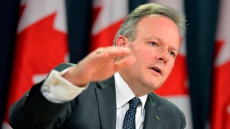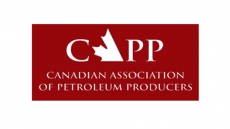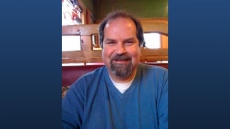The Harper government's stubborn push to eliminate the deficit in its election-year budget has opened a debate: should it even bother scrambling to balance the books at all, particularly with the financial sting of the oil slump?
Finance Minister Joe Oliver has stressed the importance of pulling the country back into the black in 2015, a pre-electoral pledge his government made long before the unexpected, late-2014 price plunge.
Economists, meanwhile, have maintained there's little economic difference between running a small surplus or posting a narrow deficit.
The latest group to enter the debate, a left-leaning think-tank, argues the government lacks "strong justification" to continue on its path toward budgetary balance during such weak economic times.
The Canadian Centre for Policy Alternatives' own "alternative" budget, to be released Thursday, says the government's drive for balance comes from political pressure it brought upon itself.
"Rushing to produce a federal surplus through substantial cuts to services that all Canadians rely on, in the midst of a weak labour market, has impaired Canada's post-recession recovery," the document said.
"In general, we can say the federal government has focused on its own affairs to the detriment of the country. It is balancing its own books through service cuts in order to pay down its own debt."
Canadians, the alternative budget said, would be better off if the government instead concentrated on creating jobs and reducing poverty.
When it comes to the actual federal budget, anticipation over what it will contain has been building for months.
The steep slide in oil prices forced Oliver's department to take the unusual step of delaying the budget's release until at least April. The documents are typically tabled in February.
The government says it's been trying to get a handle on the negative economic impact of cheaper crude, which it acknowledges will chew billions from federal coffers.
In November, the government projected a $1.6-billion surplus for 2015-16. Oil prices, however, have dropped even further since then.
Oliver has repeatedly maintained the government will reach the goal, regardless of the crude prices. He has suggested it may have to use some of its $3-billion contingency reserve.
He recently underlined the value of the government's balance-or-bust approach.
Earlier this month, Oliver told a conservative networking event that achieving a balanced budget would help the economy by boosting the confidence of investors and consumers.
He also said it would help protect the country's triple-A credit rating, leave less debt for future generations and shield the economy from international shocks such as tumbling oil prices.
"If we were in difficult financial circumstances, that precipitous decline in oil prices would really have put us in a very difficult position," Oliver told delegates at the Manning Centre event in Ottawa.
"But because we're fiscally strong, we're able to deal with it. I mean, there's a hit, but it's a hit we can cope with."
Oliver also addressed the argument that a deficit of a couple of billion dollars would only have a slight impact in the context of an economy worth almost $2 trillion.
He said once the government agrees to run a deficit, the difference between a shortfall of $2 billion and $4 billion no longer seems as large.
"And then you're down the path," said Oliver, who continued by outlining the political calculation behind the decision whether to balance the books, or not.
"If someone has a $10-billion deficit (projection) and they end up with $11 billion, well, the press is bad for half a day.
"If you say you're going to have a balanced budget, but instead you're showing a $1-billion deficit — that's a big deal. And so, there's a discipline that's imposed by that commitment."
New Democrat finance critic Nathan Cullen said the government's "political obsession" with delivering a balanced budget must now overcome the combined effect of three challenges: the collapse in oil prices, a weakening economy and the Tories' big-ticket tax measures that were "entirely about buying votes."
As a result, Cullen expects the government will have to present a "severe austerity budget" in order to balance the books.
"They've painted themselves into quite a corner and now we'll see if they can get themselves out of it," he said.
Would an NDP government be prepared to run a shortfall?
Cullen replied by saying the answer to such a hypothetical question would depend on the decisions that led up to the economic situation.
He added the NDP would ditch "unfair, expensive" policies like the Conservatives' income-splitting tax measure.
Liberal finance critic Scott Brison said he couldn't say whether his party would run deficit until it saw the books. He added he's skeptical about Conservatives' bookkeeping approaches.
"The surplus that they are seeking to create is all about politics — it's not about a real surplus," Brison said.




